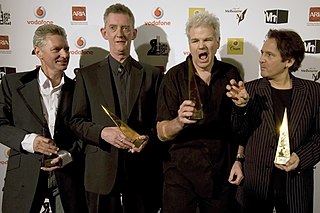
Dragon are a New Zealand rock band which was formed in Auckland in January 1972, and, from 1975, based in Sydney, New South Wales, Australia. The band was originally fronted by singer Graeme Collins, but rose to fame with singer Marc Hunter and is currently led by his brother, bass player and vocalist Todd Hunter. The group performed, and released material, under the name Hunter in Europe and the United States during 1987.
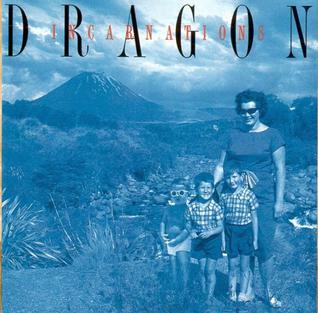
Incarnations is the tenth studio album by New Zealand-Australian band, Dragon. The album was released in 1995. and is an acoustic album of their previously released material. It was their final studio album for eleven years, their last before their second split in 1997 and their last to feature Marc Hunter before his death in 1998.
Marc Alexander Hunter was a New Zealand rock and pop singer, songwriter and record producer. He was the lead vocalist of Dragon, a band formed by his older brother, Todd Hunter, in Auckland in January 1972. They relocated to Sydney in May 1975. He was also a member of the Party Boys in 1985. For his solo career he issued five studio albums, Fiji Bitter, Big City Talk, Communication, Night and Day and Talk to Strangers. During the 1970s Hunter developed heroin and alcohol addictions and was incarcerated at Mt Eden Prison in Auckland in 1978. He was recklessly outspoken and volatile on-stage. In November 1978, during the band's American tour, supporting Johnny Winter, they performed in Dallas, Texas, where "he made some general stage observations about redneck buddies, illegal oral sex and utility trucks" and called the audience members "faggots". Upon his return to Australia, in February 1979, he was fired from the group by his brother, Todd.
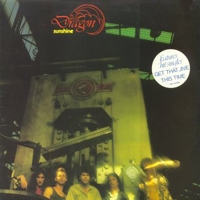
Sunshine is the third studio album by New Zealand rock band Dragon, it was their first album after they had relocated to Sydney, Australia in May 1975. Sunshine was released in February 1977 by CBS Records and peaked at #24 on the Australian national albums charts. The album was certified gold. The single "This Time" had been released in late June 1976, which peaked at #26 on the Australian national singles charts. The second single "Get that Jive" was the best charting peaking at #13 and the third single "Sunshine" reached #36. The album had US and International releases in 1978 on Portrait Records, with "This Time" called "In the Right Direction" and an alternative cover used.
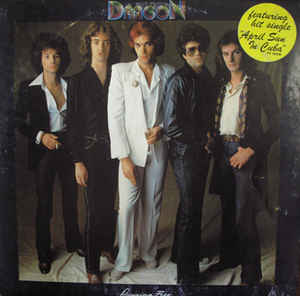
Running Free is the fourth studio album by New Zealand rock band Dragon. It was produced by Peter Dawkins and was originally released in November 1977 on vinyl and re-released on CD in 1989. The album peaked at number 6 on the Australian Kent Music Report. The album was certified triple platinum in Australia.

Snake Eyes on the Paradise Greatest Hits 1976–1989 is a compilation album by rock music group, Dragon, released in 1998. This is the single disc version - there is also a two-disc version called Tales from the Dark Side Greatest Hits and Choice Collectables 1974–1997, which has this disc plus a second disc of album tracks, live, b-sides and other rarities. The album charted at number 70 on the ARIA Charts.

Tales from the Dark Side Greatest Hits and Classic Collectables 1974-1997 is a compilation album by rock music group, Dragon, released in August 1998. Disc one has the same track listing as Snake Eyes on the Paradise Greatest Hits 1976–1989, which was issued in the same year. Disc two consists of album tracks, live, b-sides and other rarities.
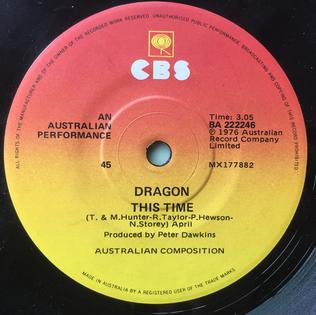
"This Time" is a song by New Zealand band Dragon, released in 1976, and included on their album Sunshine. It was released as a single in June 1976, and peaked at No. 26 on the Australian national singles chart, remaining on the chart for 23 weeks

"Get That Jive" is a song by Australian–New Zealand band Dragon released in March 1977 as the second single from the band's third studio album, Sunshine (1977). "Get That Jive" peaked at No. 13 on the Australian Kent Music Report. It was the first of the group's singles to feature drummer Kerry Jacobson.

Dragon's Greatest Hits Volume 1 is the first greatest hits album by New Zealand group Dragon, released in April 1979 through CBS Records. It includes tracks from the band's three CBS/Portrait albums, Sunshine, Running Free and O Zambezi, as well as three non-album tracks; "Wait Until Tomorrow", "Konkaroo" and "The Dreaded Moroczy Bind". Dragon's Greatest Hits Vol. 1 peaked at number 8 on the Australian Kent Music Report.
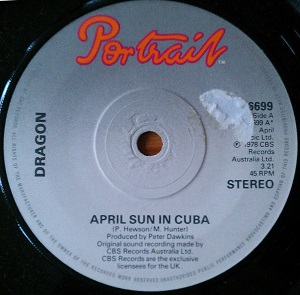
"April Sun in Cuba" is a song recorded by New Zealand group Dragon, released in October 1977. It is the first single to be released from Dragon's fourth studio album Running Free. "April Sun in Cuba" first charted on 7 November 1977, peaking at number 2 on the Kent Music Report Singles Chart and staying on the chart for 22 weeks. It also reached number 9 on the New Zealand singles chart. The b-side of the single, a non-album track called "Telephone", was credited to "Dr. Agony".
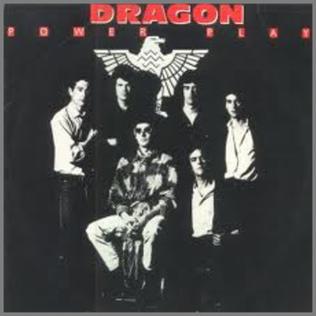
Power Play is the sixth studio album recorded by Australian-New Zealand group Dragon, released in September 1979. It was the group's first album without their iconic singer Marc Hunter although arguably it was the lack of support from the group's label, rather than a decline in quality of the group's output, that accounted for its poor commercial performance: Power Play peaked at number 64 on the Australian Kent Music Report. It was the group's final studio album for five years; they split up in December 1979. Unlike other Dragon albums from the 1970s, it has not been reissued on CD, except as a bootleg; notwithstanding that Dragon in its current form has been playing for over a decade with Mark Williams as singer, Power Play appears to be regarded as 'non-canon' amongst the group's records.
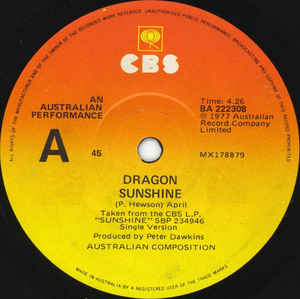
"Sunshine" is a song by New Zealand–Australian rock band Dragon, released in July 1977 as the third and final single to be released from the band's third studio album Sunshine (1976). It peaked at number 36 on the Kent Music Report and remained in the chart for 15 weeks.
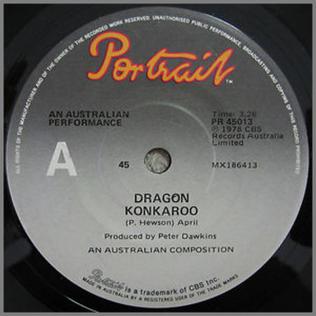
"Konkaroo" is a song by New Zealand band Dragon, released in April 1978. A non-album single, it was included on the group's first greatest hits, Dragon's Greatest Hits Vol. 1 in 1979. The b-side, "Mr. Thunder", appears on the group's fourth album Running Free. The single did not chart.
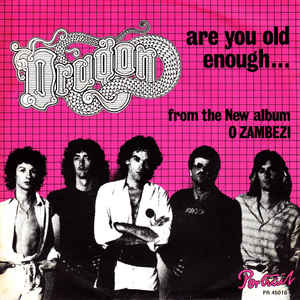
"Are You Old Enough?" is a song by New Zealand rock band Dragon, released in August 1978 while the band were still based in Australia. It was released as the first single from the group's fifth studio album O Zambezi (1978). The song peaked at number one on the Australian Kent Music Report, becoming the group's first number-one single.
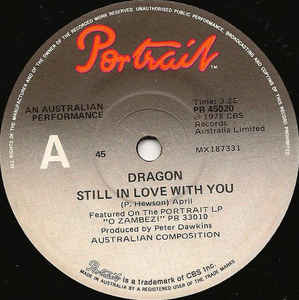
"Still in Love with You" is a song by then Australian-based New Zealand rock band Dragon, released in October 1978 as the second and final single to be released from the band's fifth studio album O Zambezi (1978).

Live One is the first live album by Australian-New Zealand rock band Dragon. The album was recorded on 10 August 1984 at the Sydney Entertainment Centre during the promotion of the Body and the Beat album. Live One was released in June 1985 and peaked at number 62 on the Australian Kent Music Report.
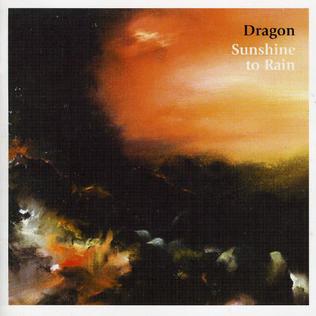
Sunshine to Rain is the eleventh studio album by New Zealand-Australian band, Dragon. The band reformed featuring Mark Williams on vocals. The album was released on 27 June 2006 and is their first since 1995's Incarnations. The album debuted and peaked at number 87 on the ARIA Charts. The album release was followed with a tour.

So Far is a compilation album by New Zealand group Dragon, released in January 1988 through J&B Records, under licence from CBS Records and PolyGram Records. The album was released as the band's cover version of Kool & The Gang's "Celebration" was in the top 20 in Australia, on the RCA Records label.
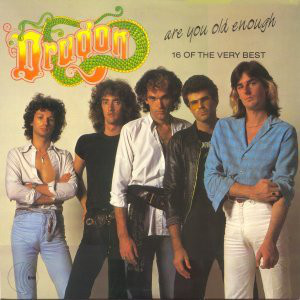
Are You Old Enough is a compilation album by New Zealand group Dragon, released in 1983 through budget label K-tel. The album includes all tracks from the 1979 LP Dragon's Greatest Hits Vol. 1 and adds six album tracks from the group's tenure with the Portrait label, while omitting the top 40 single "Love's Not Enough" or any tracks from Power Play which did not feature Marc Hunter as vocalist.



















